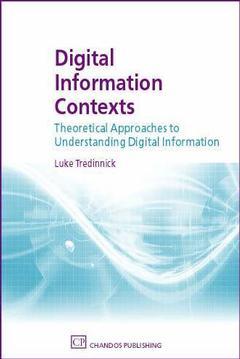Description
Digital Information Contexts
Theoretical Approaches to Understanding Digital Information
Chandos Information Professional Series
Author: Tredinnick Luke
Language: English
Approximative price 59.52 €
Subject to availability at the publisher.
Add to cart
Publication date: 09-2006
200 p. · Paperback
200 p. · Paperback
Description
/li>Contents
/li>Biography
/li>Comment
/li>
This book is an introduction to critical and theoretical perspectives on digital information. It outlines the origins of information management in nineteenth-century humanism, the adoption of scientific perspectives in the documentation and information science movements, and modern theoretical frameworks for understanding the social, cultural and political place of digital information. Digital Information Contexts is the first book aimed at information professionals to give a detailed outline of important perspectives on information and meaning, including post-structuralism and post-modernism. It explores parallels between information management and media, communication and cultural studies. Each chapter includes recommended further reading to guide the reader to further information. It is a comprehensive introduction to theoretical frameworks for understanding and studying digital information.
The meaning of information; Librarianship and print culture; Digital information, science and the social sciences; Digital information and computer science; Digital information, language and representation; Digital information and semiotics; Digital information and post-structuralism; Digital information and post-modernism; Digital information and complexity; Understanding digital information.
Luke Tredinnick is a Senior Lecturer in Information Management at London Metropolitan University and Course Director for the MSc on Digital Information Management. He teaches on a wide range of topics around the digital information area, including digital libraries, intranets and extranets, knowledge applications and technologies, cyberculture, and the social, political and theoretical aspects of digital information.
- General theoretical introduction to digital information management
- Explores the application of critical theory, communications and media theory to understanding digital information
- Historical and critical perspective
© 2024 LAVOISIER S.A.S.
These books may interest you

Introduction to Digital Media 102.59 €

Introduction to Digital Media 34.73 €


